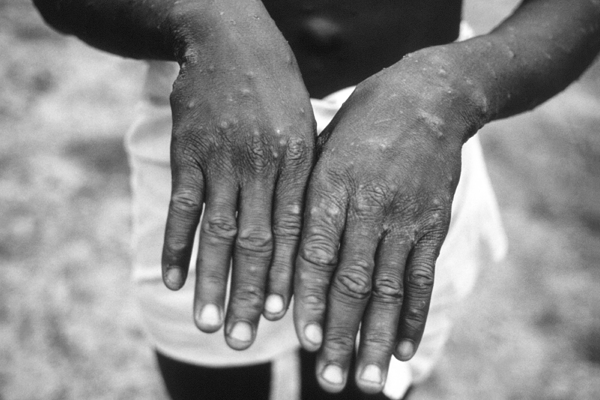Look for monkeypox reagents, vaccines

In this file photo taken on January 07, 2011 this handout photo provided by the Centers for Disease Control and Prevention was taken in 1997 during an investigation into an outbreak of monkeypox, which took place in the Democratic Republic of the Congo (DRC), and depicts the dorsal surfaces of a monkeypox case in a patient who was displaying the appearance of the characteristic rash during its recuperative stage. PHOTO/AFP
What you need to know:
- The issue: Monkeypox virus.
- Our view: Government should also as a matter of urgency establish an interim taskforce on monkeypox and a draft plan to reach out to development partners.
Monkeypox is not fake news, the new virus threat is real. The global cases of the monkeypox virus have now surpassed 1,000 and confirmed cases of the virus have been reported in at least 32 countries. Another 1,300 cases are being investigated.
Monkeypox is transmitted to humans through close contact with an infected person or animal, or with material contaminated with the virus. The virus, according to the World Health Organisation (WHO), is transmitted from one person to another by close contact with wounds, body fluids, respiratory droplets and contaminated materials such as bedding.
The good news is that unlike Covid-19, with monkeypox disease, vaccination is only needed for individual cases. The incubation period is up to 21 days after close contact with the infected person. Monkeypox symptoms include fever, rash and swollen lymph nodes and may lead to a range of medical complications and death.
Monkeypox is a viral zoonosis (a virus transmitted to humans from animals) with symptoms similar to those seen in the past in smallpox patients, although it is clinically less severe. The new virus predominantly occurs in Central and West Africa, often in proximity to tropical rainforests. Animal hosts include a range of rodents and non-human primates.
If someone has monkeypox, they should know very quickly and isolate accordingly. Nevertheless, even before Uganda confirms any monkeypox case, our view is that government should start sensitising the public, especially in the urban areas to take precautions and avert the spread of the monkeypox virus.
The President needs to engage his counterpart in DR Congo to help Uganda Virus Research Institute (UVRI) secure the required reagents for monkeypox. This is critical because the best diagnostic specimens are directly from the rash – skin, fluid or crusts, or biopsy where feasible. Antigen and antibody detection methods are useful as they do not distinguish between orthopoxviruses.
Uganda has so far isolated six people in suspected monkeypox scare. Other sources say the number is bigger. The monkeypox vaccines are not available in Uganda and the country lacks the required reagents to conduct monkeypox laboratory tests. The samples taken from the suspected carriers have to be flown to South Africa.
Government should also as a matter of urgency establish an interim taskforce on monkeypox and a draft plan to reach out to development partners and make reagents and the monkeypox vaccines available. The vaccines used during the smallpox eradication programme also provide protection against monkeypox virus.




